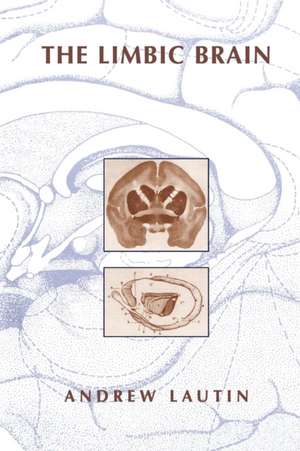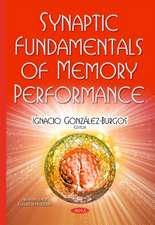The Limbic Brain
Autor Andrew L. Lautinen Limba Engleză Paperback – 13 apr 2013
| Toate formatele și edițiile | Preț | Express |
|---|---|---|
| Paperback (1) | 938.34 lei 6-8 săpt. | |
| Springer Us – 13 apr 2013 | 938.34 lei 6-8 săpt. | |
| Hardback (1) | 944.99 lei 6-8 săpt. | |
| Springer Us – 29 iun 2001 | 944.99 lei 6-8 săpt. |
Preț: 938.34 lei
Preț vechi: 1144.32 lei
-18% Nou
Puncte Express: 1408
Preț estimativ în valută:
179.56€ • 185.52$ • 149.37£
179.56€ • 185.52$ • 149.37£
Carte tipărită la comandă
Livrare economică 19 martie-02 aprilie
Preluare comenzi: 021 569.72.76
Specificații
ISBN-13: 9781475787627
ISBN-10: 1475787626
Pagini: 164
Ilustrații: XXI, 138 p.
Dimensiuni: 155 x 235 x 9 mm
Greutate: 0.24 kg
Ediția:2001
Editura: Springer Us
Colecția Springer
Locul publicării:New York, NY, United States
ISBN-10: 1475787626
Pagini: 164
Ilustrații: XXI, 138 p.
Dimensiuni: 155 x 235 x 9 mm
Greutate: 0.24 kg
Ediția:2001
Editura: Springer Us
Colecția Springer
Locul publicării:New York, NY, United States
Public țintă
ResearchDescriere
Nearly, 50 years ago, Karl Pribram in a discussion section accompanying MacLean’s proposal of a limbic system, criticized the visceral or limbic brain concept as theoretically too vague and cumbersome. In a recent review of the limbic system, Swanson points to Brodal’s criticism that the discovery of connections of limbic structures with virtually all parts of the nervous system render the concept of the limbic system useless, and better abandoned. Additional dissatisfaction surrounding the limbic brain concept stems from the feeling that it is historically inert (an antiquated 19th century construct). In our current age of neural networks, and parallel distributed process it is of little value, merely an historical curio. So why then this int- duction to limbic brain anatomy? We offer several interrelated rationales behind our labors. Recapitulation in the Service of Education: Although concepts had evolved in the second half of this century which effectively overthrew the idea of relatively isolated hemispheric districts (i. e. striatal, cortical, and limbic), parsing the hemisphere into these three districts was an important preliminary step achieved by our forebears in their efforts to understand the large scale structure of the higher mammalian cerebral hemisphere. An examination of how the limbic brain concept came to be provides an opp- tunity to recapitulate the process of exploration, discovery, and und- standing as it relates to one of these principle hemispheric domains.
Cuprins
Preface. Chapter Summaries. 1: A. Hemispheric Domains: Distinctive Features. B. Limbic Lobe: Distinctive Features - Broca's Proposal. C. An Exploration of the Cortical Limbus in the Temporal Lobe. D. Broca's Limbic Lobe: An Example of the Search for Hemispheric Archetype. E. Broca's Lobe: A Derivative of Medial Dorsal, and Lateral Pallial Districts a Window in Limbic Topology and Hodology. F. The Limbic Brain Concept - Basic Connections. 2: Introduction to Papez's Circuit. A. Brain Transection (Stimulation). B. Contributions from Comparative Neuroanatomy. C. Anatomic Mediation of Emotions (Awareness). D. Papez's Circuit. E. Towards a Limbic System. References. 3: Introduction to MacLean's Contribution. A. The Dissemination of Papez's Proposed Mechanism of Emotion. B. From Papez's Circuit to MacLean's Limbic System. C. An Ambitious Synthesis: The Limbic Brain in an Evolutionary Biologic Context. D. Controversy Surrounding MacLean's Triune Brain Construct. Conclusion. 4: Nauta's Limbic Midbrain: Introduction. A. The Concept of the Limbic Midbrain Area. B. Interconnections of Limbic Midbrain Circuit to Spinal and Frontal (Neocortical) Districts. C. An Extended Limbic System: Neurobehavioral Implications. 5: A. Subcortical Projections of the Allocortex: Anatomical Implications for the Limbic System Concept. B. Limbic Striatal Integration - A Model for the Functional Interface Between Limbic and Motor Systems.












